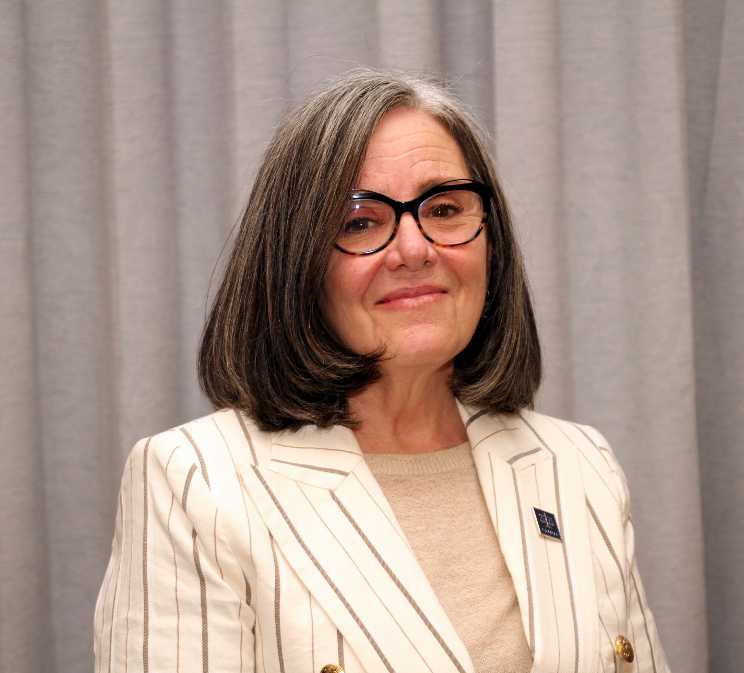This sponsored column is by Law Office of James Montana PLLC. All questions about it should be directed to James Montana, Esq., Doran Shemin, Esq., Janice Chen, Esq., and Austen Soare, Esq., practicing attorneys at The Law Office of James Montana PLLC, an immigration-focused law firm located in Falls Church, Virginia. The legal information given here is general in nature. If you want legal advice, contact us for an appointment.
[This is the fourth installment in our new series here at Statutes of Liberty, in which we interview professionals in our field to provide our readers with varying perspectives on what it is like to work in the immigration system.]

Q: As always, we start with the same question: Who are you, and what do you do?
A: My name is Anna Gallagher. I’m the Executive Director of CLINIC — the Catholic Legal Immigration Network. I like to say that we’re the biggest immigration firm for poor people in America.
Q: What does that mean, in practice? Do you have franchises all over?
A: We don’t have franchises. We have affiliates. About one-third of our affiliates are part of Catholic Charities USA — like your former employer, Catholic Charities Immigration Legal Services of the Archdiocese of Washington.
Q: What about the other affiliates? Are they non-Catholic?
A: Of course. Two-thirds of our affiliates are part of another religious tradition or are secular in orientation. A good example of a non-Catholic affiliate is HIAS, in Silver Spring — the oldest refugee agency in the world, which is Jewish in origin and, like CLINIC, ecumenical in action.
Q: What do the affiliates do?
A: The affiliates offer low-bono — “cheap,” in plain English — legal services to poor immigrants. Affiliates range in size from two lawyers to two hundred and fifty legal practitioners and support staff.
Q: When you say “legal practitioners,” what do you mean?
A: You don’t have to have a law degree to help immigrants. BIA-accredited representatives are — let me be frank here — a wonderful thing. In the 1940s, the Department of Justice established a pathway to accredit appropriately trained people at recognized nonprofits…
Q: Paralegals?
A: You don’t have to be a paralegal to be a BIA-accredited representative, though many BIA reps are paralegals. It’s a skills-based assessment. You have to learn the hard facts of immigration law and have an accredited nonprofit organization to support you.
Q: Can BIA-accredited reps go to immigration court?
A: Yes, they can. Fully-accredited representatives can represent immigrants in immigration court, before USCIS, and before the Board of Immigration Appeals itself, just like lawyers can.
Q: So, if the affiliates employ the legal practitioners, and the practitioners represent the poor people, what does CLINIC itself do?
A: We help affiliates get accredited, so they can get representatives into the trenches. The paperwork can be a real obstacle for small nonprofits; we walk them through it so they can focus on their mission.
Q: Do you do this for free?
A: Yes.
Q: Why?
A: There aren’t enough lawyers in this country to meet the demand. Most immigrants facing deportation can’t find a lawyer at a price they can afford. We try to fill the gap.
Q: Other than fill out forms — nothing against that, that what all immigration lawyers do! — what else does CLINIC do?
A: We provide practice guides, trainings, updates on the law, and backgrounders for immigration lawyers both in and out of our affiliate network.
Q: Are those resources open to non-affiliates? Like, our readers?
A: Yes, some of them. We offer trainings conducted by top-notch immigration lawyers on important topics, and lots of them are open to the public. For example, we did a recent webinar on how Afghan allies of the United States can try to apply for adjustment of status. It’s on our website for free. Have at it! I want everyone to know this information.
Q: Do you do legislative advocacy work?
A: No, not at all. We focus on technical assistance and partnership with our affiliates. The U.S. Conference of Catholic Bishops does the advocacy work in Washington — our role is not to lobby Congress, but to serve as independent experts about the facts on the ground. That’s why we’re trusted both by the USCCB and by the government. We have great relationships with DOJ and DHS…
Q: DHS?
A: Yes! They like us, because our organization makes the work of government easier. Our affiliates, through careful and zealous representation of their clients, make it much easier to reach a just result under the law. And that’s a good thing.
Q: Does CLINIC accept donations from the general public?
A: We accept donations, and they’re fully tax-deductible. [James notes: Here is a link.]
Q: What if one of our readers is a lawyer who wants a pro bono case? Where should they go?
A: They can email me directly. We love pro bono attorneys, and I promise you that we have plenty of deserving cases to go around. My email is [email protected].
Q: Wow.
As always, we welcome your comments and will do our best to respond.


